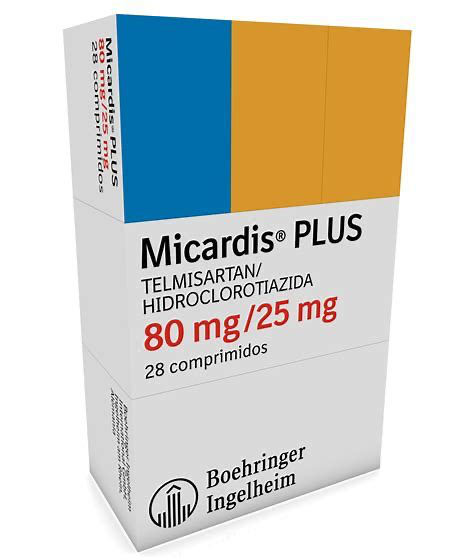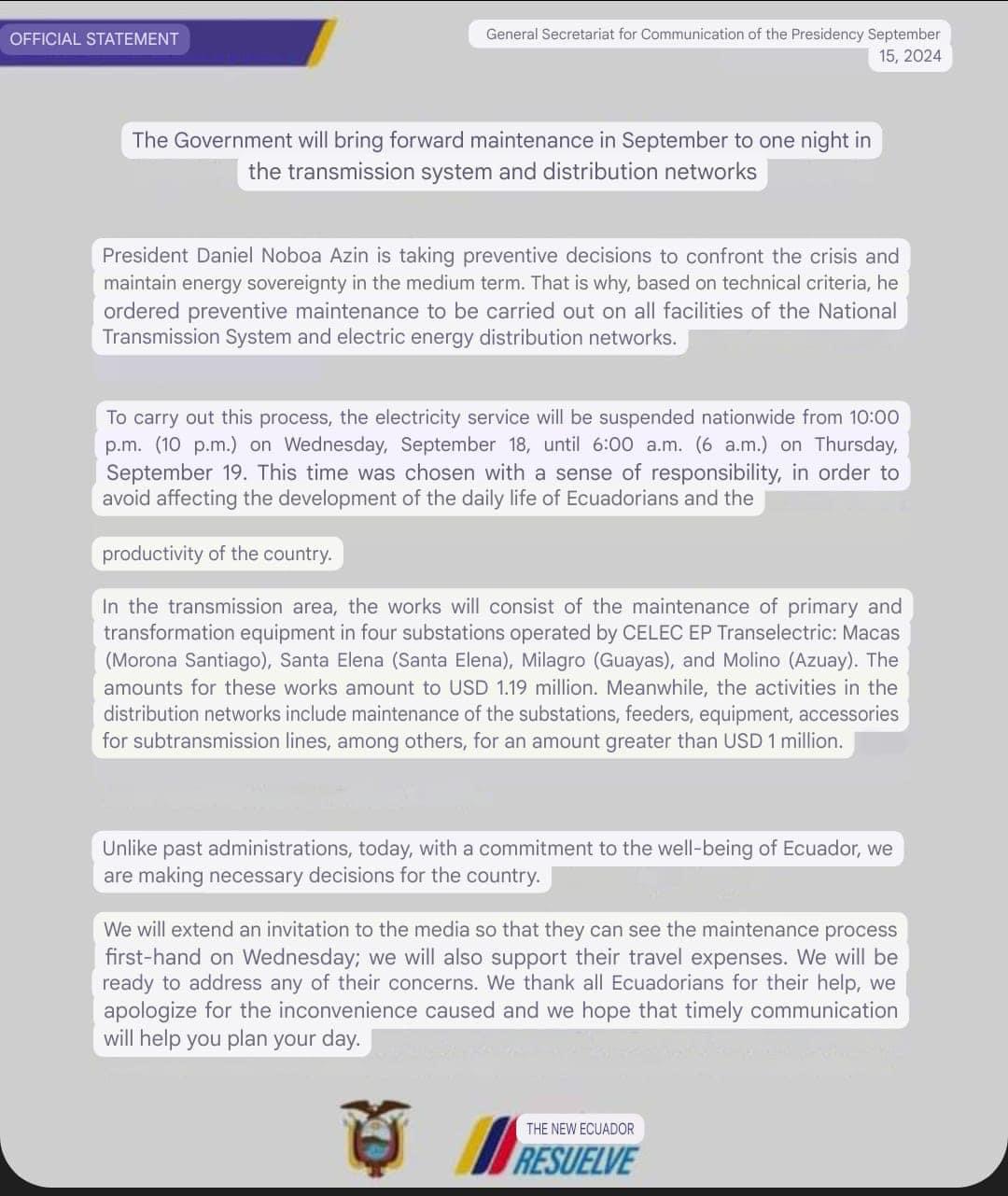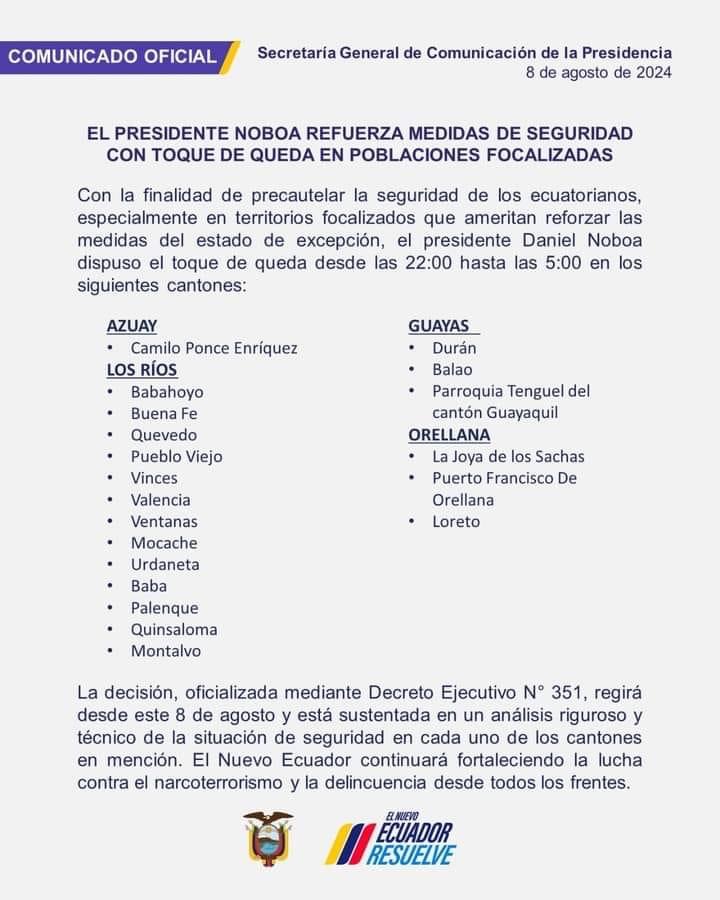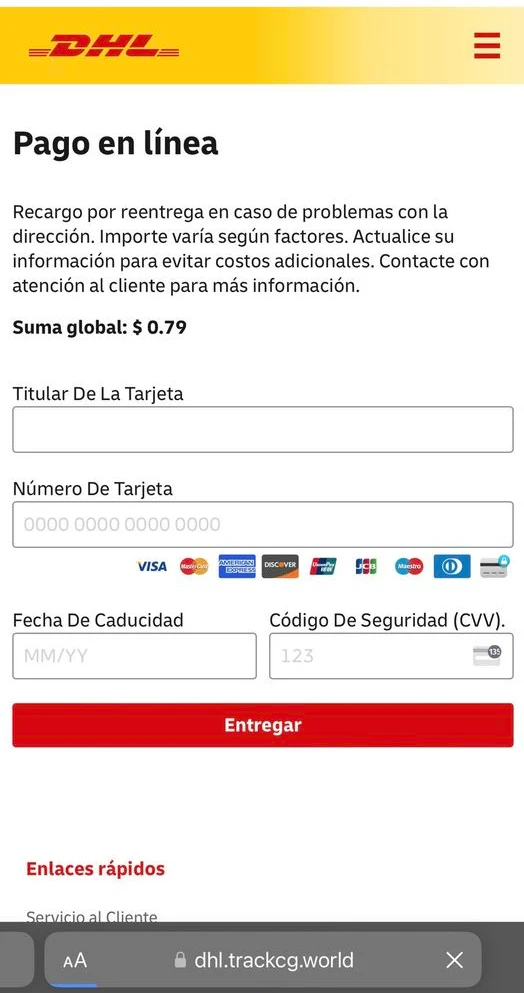Write a Post
Electrical engineers warn of possible blackouts in April due to dry season
Electrical engineers in Ecuador are warning of potential blackouts in April, coinciding with the onset of the dry season. The lack of rainfall during this period could worsen the country’s existing energy deficit, which has not been fully addressed. Marco Acuña from the College of Electrical Engineers of Pichincha explained that while rainfall has helped hydroelectric plants like Coca Codo Sinclair maintain energy production, the dry season will reduce output from these plants. This could lead to an energy shortfall of up to 2,000 megawatts, exacerbating the crisis.
The country has yet to install the promised new thermal energy sources, such as the Progen project, with only 336 megawatts added from the Toachi Pilatón hydroelectric plant and power barges. This capacity is insufficient to meet demand during periods of low water flow, and ongoing maintenance issues could make matters worse.
To address the shortfall, the Advisory Council is recommending repairs to the thermoelectric park, which could add 500 megawatts to the grid. Additionally, Acuña pointed out that the Mazar reservoir, which is being conserved, can only provide energy for 30 days.
Source: EcuaVisa.
Arcsa Orders Recall of Contaminated Cocoa Batch After Finding Cadmium
A few days ago, Arcsa discovered methanol in an alcoholic beverage, which, like cadmium, can be harmful to health.
The National Agency for Health Regulation, Control, and Surveillance (Arcsa) has issued a new health alert after detecting heavy metal contamination (cadmium) in batch 0020 of the product Cocoa 100% Soluble Ecuadorian Cocoa, manufactured by Fábrica BIOS Cía. Ltda.
In a statement released on the afternoon of January 27, the agency warned that consuming foods with high levels of cadmium can lead to serious health issues, such as severe stomach irritation, vomiting, diarrhea, and long-term damage to vital organs like bones, lungs, and kidneys. This can significantly impact the quality of life for those who consume it.
According to the tests conducted, this batch does not meet the standards set by the International Codex Alimentarius CXS 193-1995, as the cadmium content exceeds the allowed limits. As a result, Arcsa has ordered the immediate removal of batch 0020 from the market and suspended the company’s Good Manufacturing Practices (GMP) certification.
Source: Expreso.

Influenza Vaccination Available Until February 28, 2025
The annual influenza vaccination remains available until February 28, 2025, at public health centers nationwide.
Counterfeit Medicine Circulating (Micardis Plus)
The manufacturer has issued a warning about the counterfeit and illegal sale of a batch of tablets, which pose a health risk.
On January 20, 2025, the Regulatory Agency for Health Control (Arcsa) issued an alert regarding the counterfeit batch of Micardis Plus 80/12.50mg tablets, lot number 104077. The product was falsified and unlawfully sold in Ecuador.
Boehringer Ingelheim, the company behind the product, notified Arcsa about the counterfeit version of their medication. Upon investigation, it was discovered that the batch, originally intended for the Turkish market, had been smuggled into Ecuador in fake packaging.
Health Risks
"Since this is a counterfeit product, we cannot guarantee its authenticity or its contents," warned Arcsa. "We have no traceability of its distribution or information on its supply chain. Therefore, we cannot ensure its quality, safety, or effectiveness."
As a result, this counterfeit medicine poses a significant health risk to the public.
Arcsa's Recommendations
- Do not sell, distribute, or use the Micardis® Plus 80/12.50mg tablets, lot 104077.
- Only purchase products with a valid Health Registration and from authorized establishments.
- If you encounter or have information about the illegal sale of this batch, report it to Arcsa via email at control.posterior@controlsanitario.gob.ec or through the Arcsa Mobile app.
- Report any adverse events related to the use of this medication to farmaco.vigilancia@controlsanitario.gob.ec.

Stay Safe During High Waves: Tips for Visiting Ecuador’s Beaches
If you're planning to spend New Year’s weekend at the beach, be aware of a high wave alert in Ecuador from December 31, 2024, to January 3, 2025.
Beaches Under Alert
The National Secretariat for Risk Management reports:
High risk (red flag): 26 beaches
Medium risk (yellow flag): 15 beaches
Safety Tips for Beach Visitors
With rough seas expected, follow these six safety tips to protect yourself:
Stick to designated areas: Only swim or use boats in marked zones.
Check conditions: Ask local authorities or lifeguards about the wave and tide status.
Be cautious during low tide: Rip currents and strong waves are more intense.
Prepare for the weather: Use appropriate gear for sun and wind protection.
Avoid alcohol before swimming: Stay out of the water if you’ve been drinking.
Wear life jackets on boats: Always use safety gear for water activities.
Alert Flag System
Pay close attention to flag warnings at the beach:
Red: Do not enter the water.
Yellow: Enter with caution.
Green: Safe to swim.
Source: Primicias.
Oropouche virus alert
Over 10,000 cases of the Oropouche virus (OROV) have been reported globally in 2024, affecting countries like Brazil, Ecuador, and Colombia, as well as parts of Europe. Ecuador has documented two cases, both of which resulted in full recovery.
Oropouche is transmitted primarily through the bite of the biting midge Culicoides paraensis and occasionally by the mosquito Culex quinquefasciatus. Symptoms include high fever, severe headache, photophobia, and muscle/joint pain, typically resolving within 2-3 weeks. Severe cases may lead to meningitis or encephalitis.
Currently, there are no vaccines or antiviral treatments, and the virus can have a fatality rate of up to 88%.
Preventive measures include:
Avoiding areas with high insect activity.
Wearing protective clothing and using insect repellents.
Removing stagnant water to reduce breeding grounds.
You are advised to follow these precautions to lower your risk of infection.
Cuenca Airport will be closed during weekends in December and January
The runway of Cuenca's Mariscal La Mar Airport will undergo maintenance, requiring temporary closures on weekends. The Cuenca Airport Corporation (CORPAC) has scheduled the works to minimize disruptions.
The first closure will take place from November 29 to December 1, 2024, with subsequent closures as follows:
December 6 to December 8, 2024
December 13 to December 15, 2024
December 20 to December 22, 2024
December 27 to December 29, 2024
January 1 to January 5, 2025
January 10 to January 12, 2025
January 17 to January 19, 2025
January 24 to January 26, 2025
Closure Hours:
Fridays at 11:00 PM
Reopening on Sundays at 6:00 PM
CORPAC has coordinated these dates with airlines to avoid inconveniences for flights and passengers.
Nationwide scheduled power outage on September 18 (Wednesday) and September 19 (Thursday)
Ecuador will experience a nationwide power outage from 10:00 PM on September 18 to 6:00 AM on September 19, 2024, due to maintenance on four key substations. This preventive measure aims to address the country's ongoing energy crisis, with work being done on primary equipment and transformers in locations such as Macas, Santa Elena, Milagro, and Molino.

New curfew in parts of Ecuador
The president has decreed a new curfew for parts of Ecuador from 10 pm to 5 am. See the image for the cantons with a curfew.

Scheduled Maintenance and Digital Service Suspension by SRI
The Internal Revenue Service (SRI) plans to temporarily suspend its website ( www.sri.gob.ec) and digital services like SRI Mobile and SRI & Me for scheduled technological maintenance. This interruption will occur between 00:00 and 10:00 on Saturday the 20th.
Public transportation strike suspended
According to Primicias, the National Federation of Public Transport Cooperatives (Fenacotip) has suspended the national strike initially planned for July 16-17. This decision was announced on July 15 by Abel Gómez, the manager of Fenacotip, during a press conference in Guayaquil.
Gómez explained that the suspension followed consultations with provincial leaders and was influenced by the government's declaration of a state of emergency and their underestimation of the strike threat. As a result, Fenacotip will also withdraw from dialogue tables with the government, citing ineffectiveness.
The strike was called to address road insecurity and the removal of fuel subsidies. Fenacotip is preparing a legislative proposal to include measures like panic buttons on public buses and direct GPS connections to the ECU 911 emergency system.
Gómez emphasized that normal activities would resume on July 16 and that Fenacotip would continue its advocacy efforts independently.
DHL phishing scam
The website in the picture is a so-called phishing site. It's a fake website that mimics a legitimate DHL-website. Don't pay anything via this website. If you are so unfortunate to have paid via this website, then cancel immediately the bank card that you have used to pay.

Public transportation strike announced for July 16 and July 17, 2024
The National Federation of Intra and Inter Provincial Public Passenger Transportation (Fenacotip) has announced a strike of transporters for next July 16 and 17 due to the insecurity experienced by drivers on the roads. The president of Fenacotip said that work cannot continue under these conditions without the minimum help from the authorities and the Police. He also recalled that there are people who have died and that both passengers and drivers fear all the time for their safety.
No operations at Guayaquil International Airport during the morning of July 19, 2024
The only runway of José Joaquín de Olmedo International Airport in Guayaquil will be out of service for six hours next Friday, July 19, 2024, due to scheduled maintenance work. The closure will occur from 06:30 to 12:30. During these hours the airport will stay open for passengers but no airplanes will be able to take off or land.